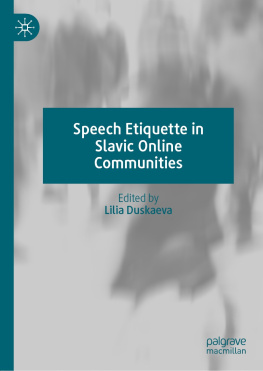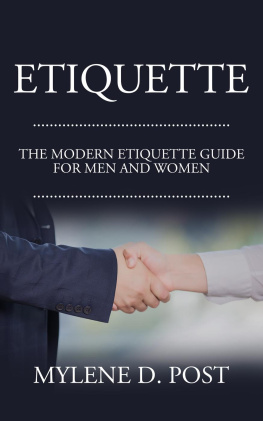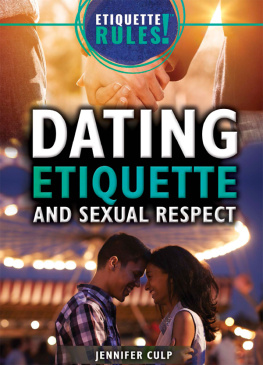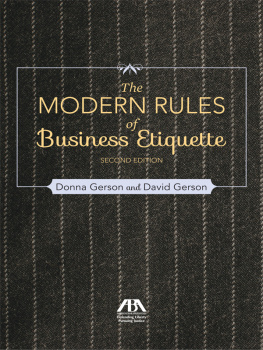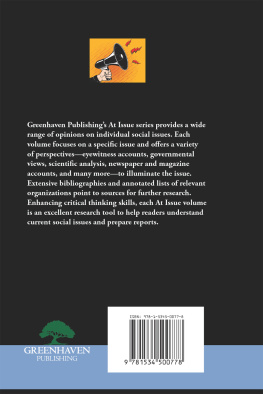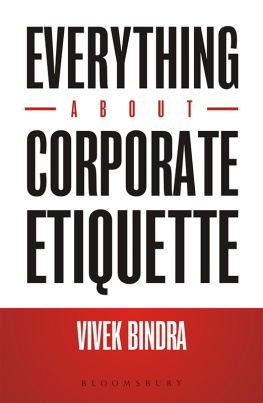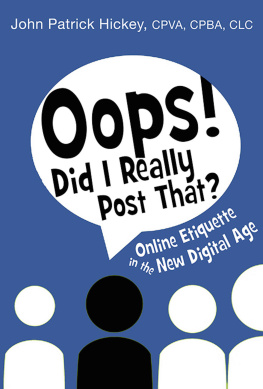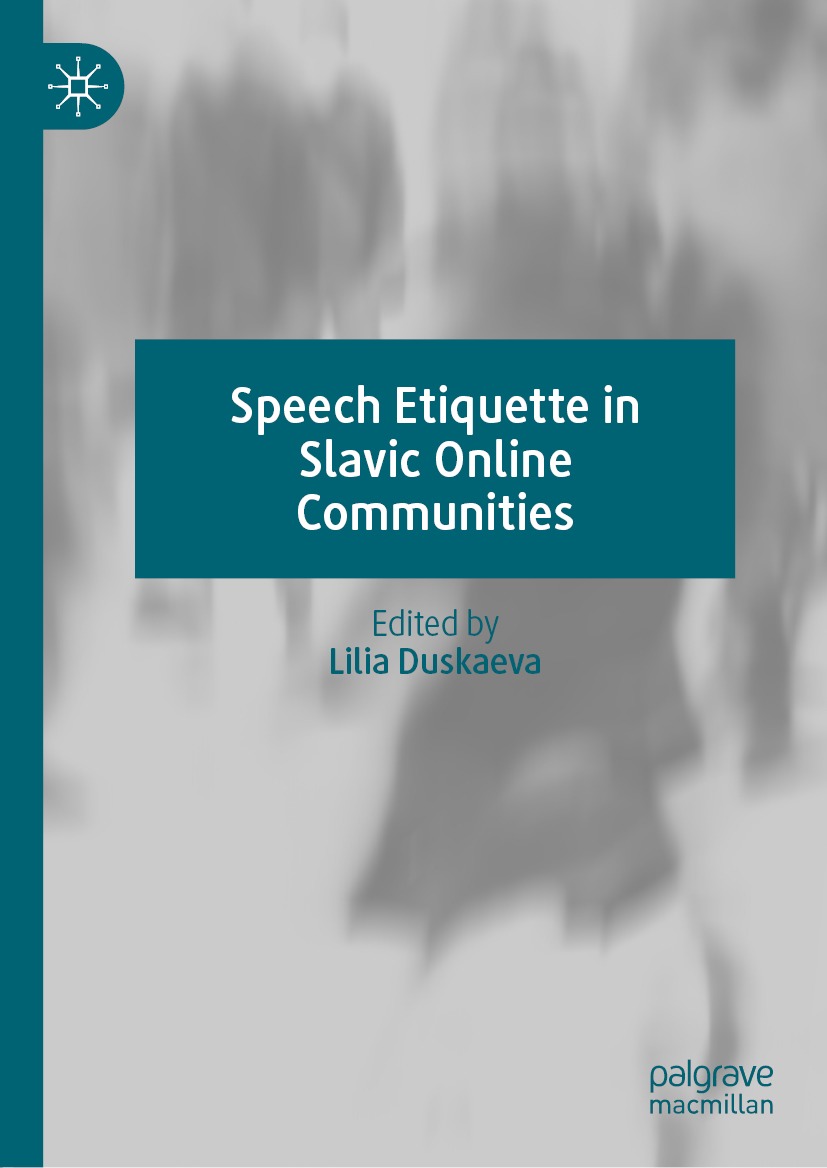Speech Etiquette in Slavic Online Communities
1st ed. 2021

Logo of the publisher
Editor
Lilia Duskaeva
Department of Media Linguistics, Saint Petersburg State University, St Petersburg, Russia
ISBN 978-3-030-81746-6 e-ISBN 978-3-030-81747-3
https://doi.org/10.1007/978-3-030-81747-3
The Editor(s) (if applicable) and The Author(s), under exclusive licence to Springer Nature Switzerland AG 2021
This work is subject to copyright. All rights are solely and exclusively licensed by the Publisher, whether the whole or part of the material is concerned, specifically the rights of translation, reprinting, reuse of illustrations, recitation, broadcasting, reproduction on microfilms or in any other physical way, and transmission or information storage and retrieval, electronic adaptation, computer software, or by similar or dissimilar methodology now known or hereafter developed.
The use of general descriptive names, registered names, trademarks, service marks, etc. in this publication does not imply, even in the absence of a specific statement, that such names are exempt from the relevant protective laws and regulations and therefore free for general use.
The publisher, the authors and the editors are safe to assume that the advice and information in this book are believed to be true and accurate at the date of publication. Neither the publisher nor the authors or the editors give a warranty, expressed or implied, with respect to the material contained herein or for any errors or omissions that may have been made. The publisher remains neutral with regard to jurisdictional claims in published maps and institutional affiliations.
Cover illustartion: eStudioCalamar
This Palgrave Macmillan imprint is published by the registered company Springer Nature Switzerland AG
The registered company address is: Gewerbestrasse 11, 6330 Cham, Switzerland
The monograph clearly demonstrates how speech etiquette in online communication adapts to the technological conditions of virtual communication. The ways and forms of supporting verbal interaction depend on the socio-cultural and ethno-specific communicative experience of the group members, their cultural memory. Digital media, just like writing and printing, has caused another cultural revolution. They form new relationships in social reality: the analysis proves that a new culture of transition of mass communication to interpersonal communication and vice versa has been formed in online communication. The study, carried out in several Slavic languages, showed that linguistic diversity is a huge wealth of the modern worldand this is one of the strongest impressions from the book.
Stanisaw Gajda, Opole University, Poland
The new communicative reality and emerging discursive practices require urgent philological reflection. The volume is a pioneering experience in the study of one of the aspects of communication in social mediathe etiquette. Its complexity lies in the fact that it is dispersed in the text flow, and it is often difficult to separate it from the informative component of media communication. The authors show that, in understanding new speech phenomena, the classical concepts of dialogue, speaker and addressee, etiquette and phatic interaction are useful and highly demanded. However, in this new communicative reality, they all work differently, in a new way. The most unexpected result of the study is the discovery of national-specific aspects on the etiquette side of global communication. I am convinced that not only will the book find its target readers, but it will also give an impetus to a new direction of media communication research.
Tatyana Viktorovna Shmeleva, Yaroslav-the-Wise Novgorod State University, Russia
Online communication has drastically changed our values, norms and identities, and hence it has become the focus of many modern research directions in the sphere of Humanities. The monograph Speech Etiquette in Slavic Online Communities is a collection of intrinsic observations and thought-provoking conclusions concerning the essence of virtual online behavior, its specific trends in various social groups and its cultural diversity in Slavic languages. The joint efforts of the scholars from Russia, Poland, Lithuania and Belarus directed at the online etiquette description have resulted in an original and multifaceted linguistic and anthropological conception to be thought over and developed in various fields of discourse analysis. The book is worth reading and discussing in our academic community.
Vladimir Karasik, Pushkin State Russian Language Institute, Russia and Tianjin Foreign Studies University, China
Written by a team of well-known researchers from several Slavic countries, the book about speech etiquette in online communities is excitingly interesting. It is distinguished by the innovative approach to the study of the eponymous communicative phenomenon defined as a system of norms for the organization of verbal and nonverbal behaviour. In constructing the typology of forms of virtual communication, the authors reasonably started from the specific identities of humanshomo loquens, homo communicans: informative and phatic types of interaction. To talk about something, to be together, to express somethingthese are the goals of both primitive people and todays homo virtualis. The idea of variability in the ratio of informative and phatic interaction proved to be productive in the construction of a linguistic typology of speech etiquette in online groups. Moreover, the appeal to the phenomenon of phatic interaction allowed the contributors of the volume to see the most significant differences in the presentation of relations between participants among different Slavic peoples. Thanks to the concept of etiquette in the discourse of network communities in the Slavic countries, a methodological basis for a consistent comparison of national customs of communication in the virtual world has been created.
Magorzata Kita, University of Silesia in Katowice, Poland
The authors of this book are using an interesting and innovative approach in their analysis of speech etiquette in social networks. The book reveals socially and nationally specific lines of etiquette that online discussions must include in order to be successful. This book has an incredible learning potential for specialists in marketing, political science, sociology, linguistics and to those who are teaching Slavic languages. It should be read by everyone who is administering an online community. I enjoyed it from the first page to the last and found lots of valuable information for myself.
Alexandre Strokanov, Northern Vermont UniversityLyndon, USA
Acknowledgments
The authors would like to thank Professor Anatoly S. Puyu, the Director of the Institute School of Journalism and Mass Communications, St. Petersburg State University. We are also grateful to our colleagues from the Department of Media Linguistics.
We would like to express our gratitude to the translators of Slavic languages for helping us to elevate our ideas to potential English audiences. Prof. Ksenia Shilikhina translated the Introduction and Chapters from Slovakian.

